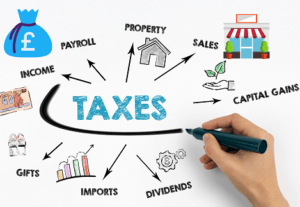We appreciate that many people are feeling the squeeze in one way or another at the moment. The media is full of advice on how to save money, shop smart and bolster budgets.
But what about the tax you pay? We’ve pulled together some top tips that could potentially reduce your tax bill.
Whether you are an employee, self-employed or the owner of a limited company; a landlord or an investor, here are some ideas to ensure you are making the most of the schemes and allowances on offer.
If you are an employee: –
- Paying into a pension scheme can save you tax. Contributions to your employer’s pension scheme can be made from your gross pay before any tax is charged. If your employer has a scheme in place these could be made by way of Salary Sacrifice, saving tax and national insurance.
- What about switching to a low-emission company car? With the low rates available for an electric car, it could be time to switch and reduce your P11D benefit.
If you are the owner/shareholder of a limited company.
- If you have made a loan to the company, the company could be paying you interest. If you are a basic rate taxpayer, you can earn £1,000 of interest before paying tax or £500 if you are a higher rate taxpayer.
- Use your dividend allowance if the company is profitable and has distributable reserves. The first £2,000 of dividends are tax free, then 8.75% for basic rate taxpayers and 33.75% for higher rate taxpayers.
- Make use of the 130% super deduction for capital allowances for companies on any ‘new’ plant & machinery if you are considering investing in capital expenditure.
Self Employed
- If investing in capital expenditure utilise the Annual Investment Allowance for capital allowances for eligible assets. This won’t apply to cars.
- If you use a car solely for business purposes, consider going electric. You may be able to claim 100% capital allowances.
- Make sure you are utilising all the loss reliefs available. There is a temporary 3 year carry back due to Covid.
If you’re an investor
- Utilise the nil rate band of £1,000 of interest if basic rate or £500 if you are a higher rate taxpayer, not forgetting the £2,000 dividend allowance.
- You also have a capital gains tax allowance of £12,300 which can be utilised each year.
- If you invest in ISA’s, you don’t pay capital gains tax when you sell the shares held within an ISA.
Landlords
- Rent-a-Room scheme allows you to receive up to £7,500 in rent each year from a lodger, tax-free.
- Make sure you are claiming all the expenses that you can claim against your rental income e.g. letting agency fees, factoring fees, cleaning, insurance, replacement of domestic items, etc.
- You can no longer claim the full deduction for loan interest on mortgages for let properties, but you can still claim a 20% tax credit on mortgage interest.
Charitable Donations
- If you are a higher rate taxpayer, you can claim back the difference between the higher rate and basic rate on any gift aid donations. This can be done through your self-assessment tax return. So, remember to keep a note of all gift aid donations made!
If you need advice on any of the suggestions to reduce your tax bill outlined here, please email our experienced Tax Advisor Fiona Mitchell at fmitchell@thomsoncooper.com.


